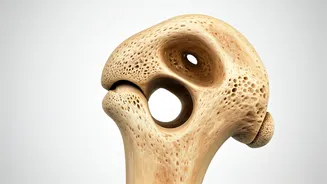Embrace Weight-Bearing Exercise
Weight-bearing exercises are fundamental for bone health. Activities like walking, jogging, and dancing place stress on bones, stimulating them to produce
more bone tissue. This process, known as bone remodeling, is essential for maintaining bone density and strength. Regular weight-bearing exercise helps prevent bone loss and reduces the risk of fractures. Moreover, these exercises improve balance and coordination, lessening the likelihood of falls, a common cause of bone fractures in older adults. Aim for at least 30 minutes of moderate-intensity weight-bearing exercise most days of the week to maximize the benefits and protect your skeletal health. Remember to consult a healthcare professional before starting any new exercise routine, especially if you have pre-existing health conditions.
Prioritize Calcium Intake
Calcium is a vital mineral for bone health, forming the structural component of bones and teeth. Adequate calcium intake is crucial for maintaining bone density and preventing osteoporosis. Dietary sources of calcium include dairy products like milk, yogurt, and cheese. For individuals who are lactose intolerant or have dietary restrictions, calcium can be obtained from fortified foods like plant-based milk, tofu, and leafy green vegetables such as kale and spinach. The recommended daily intake of calcium varies based on age and gender. Adults typically require 1000-1200 milligrams of calcium per day. If dietary intake is insufficient, calcium supplements can be considered, but it's essential to consult with a healthcare provider to determine the appropriate dosage and avoid potential side effects.
Boost Vitamin D Levels
Vitamin D plays a critical role in bone health by aiding the absorption of calcium in the body. Without sufficient vitamin D, the body cannot effectively utilize calcium, even with an adequate intake. Vitamin D is primarily produced in the skin through exposure to sunlight. However, factors like sunscreen use, limited sun exposure, and skin pigmentation can reduce vitamin D synthesis. Dietary sources of vitamin D are limited but include fatty fish like salmon, egg yolks, and fortified foods. Vitamin D supplementation is often recommended, especially for individuals at risk of deficiency. The recommended daily intake of vitamin D varies, but most adults need at least 600-800 International Units (IU) per day. A blood test can determine vitamin D levels, helping guide supplementation and ensuring optimal bone health.
Focus on Nutrition
Beyond calcium and vitamin D, a balanced diet rich in other bone-supporting nutrients is crucial. Magnesium, phosphorus, and vitamin K are other essential nutrients for bone health. Magnesium helps regulate calcium levels and supports bone structure. Phosphorus is a key component of bones. Vitamin K, found in leafy green vegetables, assists in bone formation. A diet rich in fruits, vegetables, and lean protein, while limiting processed foods, sugary drinks, and excessive alcohol consumption, supports overall health and bone strength. Ensure you consume a variety of foods to obtain all the essential nutrients. Consult with a nutritionist or healthcare professional for personalized dietary advice, aligning your diet with your specific health needs and ensuring sufficient intake of crucial bone-building nutrients.
Adopt a Healthy Lifestyle
Lifestyle choices significantly impact bone health. Avoid smoking, as it is associated with increased bone loss and fracture risk. Limit alcohol consumption to moderate levels, as excessive alcohol intake can interfere with calcium absorption and bone formation. Maintaining a healthy weight is also crucial, as both being underweight and obese can negatively affect bone health. Engage in regular physical activity, including both weight-bearing and resistance exercises, to stimulate bone remodeling and strengthen muscles, improving balance and reducing the risk of falls. Manage stress, as chronic stress can indirectly affect bone health. Make sure to get adequate sleep, maintain good posture, and consider ergonomic adjustments to reduce strain on your bones. By adopting these lifestyle habits, you can support bone health and reduce the risk of age-related bone deterioration.















